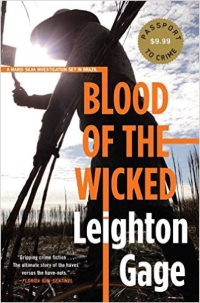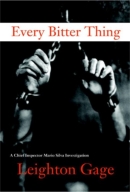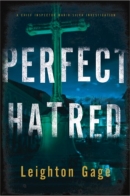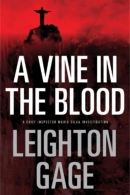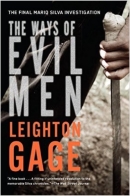|
So, know nothing about
Brazil, never been there or if you have, never left the beach? Don't worry --
Gage tells you everything you need to know and you'll come away from Blood of
the Wicked feeling you're a expert on Brazilian corruption, land reform, the
Catholic Church, and murder in the exotic country that the coolly ironic Stefan
Zweig once called "the land of the future... and always will be."
It's all a bit of a
paradox, an involuntary fantasy zone like a wet dream, so absurd, so
delightfully dangerous, so beyond anyone's control or responsibility. Read any
of the Mario Silva novels and you might think Brazil's tropicalismo vibe
is an illusion. The action is brutal; little distinction is made between
personal and political murder, vengeance and house-cleaning. In Blood of the
Wicked, the landed class and its capangas (foremen/hired gunmen) and
police death squads torture and kill as if these pursuits are mere farming
rituals, their inspiration taken from Heinrich Himmler. The State and the
Church -- that bilateral moral interface -- have almost no effective authority
in a social order that is so corrupted that the various levels of public
protection -- Federal, State, Municipal -- are openly contemptuous of each
other, so feral and territorial that their police act more like regional
warlords than servants of the people.
You'd think that the
protagonist -- Chief Inspector Mario Silva, a Federal cop working out of
Brasilia -- would have some pre-emptive authority when he's sent by his
Director to Cascatas, a back-water town deep in the tobacco lands south of
Sâo Paulo, but the corruption is so systemic that Silva is often the last
to know when anything important to the case breaks, a new murder or a new
witness, so that he's reduced to a mere point-of-view for the reader rather
than an intellectual man of action or a pulp fiction bully. This might be an
advantage, as neither he nor his team -- his nephew Delegado Hector
Costa and Agente Arnaldo Goncalves -- get in the way of the story, which
is as much a documentary expose of the Brazilian land wars as it is a murder
mystery.
You know who's doing a
lot of the killing: Colonel Emerson Ferraz, the arrogant primate in charge of
the municipal force, as this is a Chekovian secret known early to the reader
but not the visiting Federal investigators. You think this is the back story as
the initial investigation concerns the death of Bishop Dom Felipe Antunes, a
priest who has flown into Cascatas to consecrete a new chapel only to be gunned
down by a sniper as he steps out of the helicopter. Immediately the
assassination becomes part of not only church politics but also the land war...
and the political divide that cripples today's Brazil, a country of 180 million
where 1% of the population owns 50% of all the arable land.
These figures come
from a short erudite background essay; Gage appends one to the end of each
novel in the Mario Silva series, so you know he isn't just blowing smoke when
it comes to the issues.
Chief Inspector Mario
Silva: Federal policeman, trained as a lawyer, ex-smoker, his father murdered
by drug punks, brother-in-law too, son died as a child from leukemia, wife
somewhat alcoholic as a result, himself an occasional drinker, but disciplined,
acerbic, polite in most situations, ironic rather than sarcastic, loyal to his
family and country beyond all else, pragmatic, so will take extra-legal
vengeance if the state can provide no justice. Ergo, the world of Mario Silva
is a modern western within the lawless wilderness that is Brazil.
Silva (to Stella
Saldana in Perfect Hatred, Book 4 of the series):
"Senhora, I've been
in the service of a corrupt legal system for all my life. I'm nothing if not a
pragmatist... but I'm also a realist. And any evil I do, I attempt to do it for
the greater good."
So he's a low-key
vigilante if it's the only way forward. He allows women to go free if they are
the victims of habitual wife beaters, and arranges for criminal escapes as a
means for extra-judicial executions. Sometimes he and his capos merely watch as
the criminal is eliminated by his victims or other criminal colleagues. On a
lighter level he's not adverse to the use of blackmail to obtain a quid pro
quo, some information or concession from a witness or suspect who is being
stubborn or has a genuine fear for his/her safety. His manner is cool, polite,
official, seldom the bully cop with a Glock 9 and a Federal Warrant badge.
Yet for the most part
Mario Silva is just an outline, a manichino the reader inhabits as a
point-of-view rather as a protagonist. The protagonist is always Brazil, who is
also the antagonist, at war with itself as it struggles within the stretched
latitudes of its volatile landscapes and the clash of its prismatic cultures.
Think of Brasilia, that spaceport of human desire and fantasy, carved out of
the wilderness as the new capital in the late 1950s, a colony of bureaucrats,
idealists, opportunists, camp followers and prospectors, located on the central
highlands, the last chance for reason before the Amazon jungle. Civilization is
always theoretical in Silva's Brazil.
|
